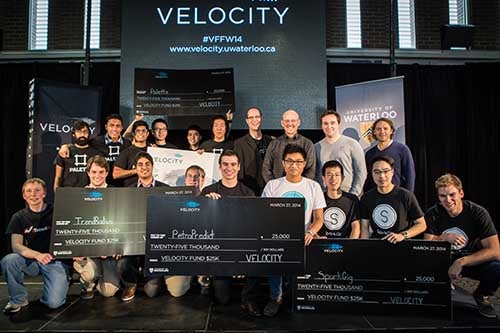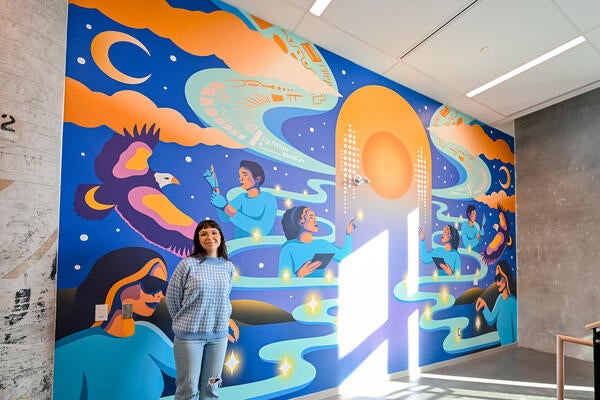
Startup wins new hardware award at Velocity Fund Finals
Palette co-founders win a spot in the new Velocity Foundry program for hardware startups

Palette co-founders win a spot in the new Velocity Foundry program for hardware startups
By Staff Marketing and Strategic Communications
Palette, a company that created a freeform hardware interface that can be built like Lego to control your favourite software, won the first-ever award for best hardware-based startup at the Velocity Fund Finals, and was one of several big winners at the event.
Hardware is a new category in the competition, and the win also secures the company a place in the upcoming Velocity Foundry. The founders of BufferBox, Mike McCauley, Aditya Bali and Jay Shah, who continue to be active with Velocity startups as volunteers and donors, inspired the new award.
“We’re very thankful to the BufferBox founders for their generous support of the Velocity community,” said Mike Kirkup, director of Velocity. “They have demonstrated the full scope of giving back with their time, mentorship and financial support. It’s amazing to have such great entrepreneurial talent helping us foster the next wave of startups coming out of Waterloo.”
Palette joins three other startups that won grants worth $25,000 and a spot to grow their businesses at Velocity. Ten startups competed.
The three other winners of the grants worth $25,000 are:
PetroPredict - A well integrity prediction engine for the oil and gas industry that enables subsurface engineers to identify low capital, high reward optimization opportunities in their fields.
Sparkgig - An online marketplace for hiring performers.
TrendRadius - Provides product management software as a service, including market insights and analytics, for companies to create profitable products that their customers love.
"It's a big day for us," said Ashish Bidadi, co-founder of Palette. "We were so looking forward to competing today. Now we have the additional support and funding we need to accelerate our product development and manufacturing."
Another 10 young entrepreneurs from the University of Waterloo pitched their startup ideas for one of three grants worth $1,000 each. The winners are:
The teams each had three minutes to pitch their startup ideas to the panel of judges. At least one founder on a pitching team must be a current student or a graduate of the University of Waterloo within the past year. Velocity takes no intellectual property rights or equity in return.
Stork Holdings president donates $1 million to Velocity
"We saw an impressive array of talent vying for these grants today," said Mike Stork, president of Stork Holdings, and one of the judges for the Velocity Fund Finals. "It's exciting to see the passion these teams have for their companies and ideas, and I look forward to them being successful."
Earlier this week, Stork made a donation of $1 million to Velocity. The generous gift will help grow the Velocity Fund to support young entrepreneurs and early-stage startups.
Other judges for the competition for $25,000 include JS Cournoyer, co-founder and partner of Real Ventures, and Devon Galloway, co-founder and chief operating officer of Vidyard.
Past winners of the Velocity Fund competition include Thalmic Labs, the makers of the MYO gesture control armband, MappedIn, makers of indoor mapping technology, and business location analytics company PiinPoint, which just became the seventh consecutive startup to participate in Silicon Valley’s highly competitive Y Combinator accelerator program.
For more information about the Velocity Fund, please visit the Velocity website.

Read more
How Doug Kavanagh’s software engineering degree laid the foundation for a thriving career in patient care

Read more
Upside Robotics secures new funding to accelerate the future of sustainable farming

Read more
Many Hearts, One Mind by Indigenous artist Alanah Jewell celebrates the act of creation shared by the Land and innovators in our community
The University of Waterloo acknowledges that much of our work takes place on the traditional territory of the Neutral, Anishinaabeg, and Haudenosaunee peoples. Our main campus is situated on the Haldimand Tract, the land granted to the Six Nations that includes six miles on each side of the Grand River. Our active work toward reconciliation takes place across our campuses through research, learning, teaching, and community building, and is co-ordinated within the Office of Indigenous Relations.